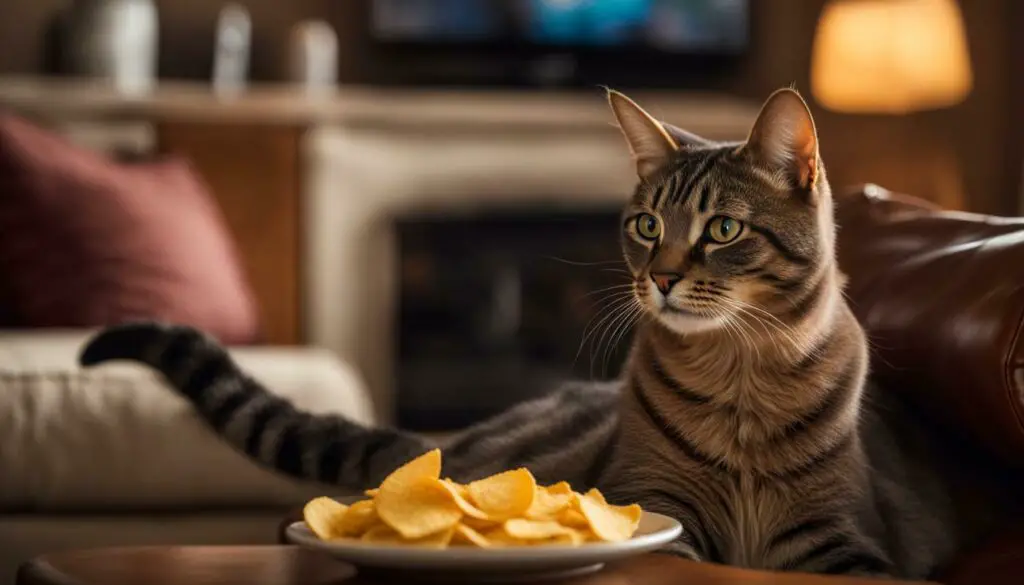If you’ve ever caught your cat eyeing your potato chips, you may be wondering if it’s safe to share this snack with them. While cats can technically eat potato chips, it’s important to understand the potential risks and consider their dietary needs.
Key Takeaways:
- Cats can eat potato chips, but it’s not recommended to include them in their regular diet.
- Potato chips are high in salt, fat, and carbs, which can lead to health problems in cats.
- Raw potatoes are toxic to cats, but cooked potato chips are safe in moderation.
- French fries should be avoided due to their high fat, salt, and carb content.
- It is best to provide cats with a balanced and nutritionally appropriate diet to ensure their overall well-being.
Understanding Cat Diet and Potato Chips
Before we can determine if cats can eat potato chips, it’s important to understand their nutritional requirements. Cats are obligate carnivores, which means their diet should primarily consist of animal-based protein. Their bodies are designed to process and derive nutrients from meat sources, making it essential for their overall health and well-being.
While cats do require some essential nutrients found in vegetables and grains, their digestive systems are not well-equipped to handle large quantities of carbohydrates. In the wild, cats consume carbohydrates indirectly through the stomach contents of their prey. Thus, their nutritional needs do not necessitate the inclusion of starchy snacks like potato chips.
Feeding cats a diet high in carbohydrates can lead to several health issues. Cats are prone to obesity, and the excessive salt, fat, and carb content in potato chips can contribute to weight gain. Additionally, a diet rich in carbohydrates can also lead to diabetes and high blood pressure in cats, just as it can in humans.
| Nutrient | Amount Required for Cats | Role in Cat’s Diet |
|---|---|---|
| Protein | High-Quality Animal Protein | Builds and repairs tissues, supports immune system |
| Fat | Moderate Amounts | Provides energy, aids in nutrient absorption |
| Carbohydrates | Minimal | Not an essential nutrient for cats |
| Sodium | Minimal | Necessary for certain bodily functions, but excessive amounts can lead to health problems |
| Vitamins and Minerals | Variety of Essential Vitamins and Minerals | Support overall health and well-being |
“Feeding cats a diet high in carbohydrates can lead to several health issues. Cats are prone to obesity, and the excessive salt, fat, and carb content in potato chips can contribute to weight gain.”
Feline Dietary Considerations with Potato Chips
When considering whether to give potato chips to your cat, it is important to prioritize their overall dietary needs and health. While an occasional, small piece of chip may not cause immediate harm, it is best to avoid making it a habit. Instead, focus on providing your feline companion with a balanced diet that includes high-quality animal protein and essential nutrients.
It’s worth noting that not all cats react the same way to certain foods. Some cats may have a more sensitive digestive system, making them more susceptible to gastrointestinal issues from consuming foods like potato chips. Additionally, factors such as age, breed, and underlying health conditions can also influence how a cat tolerates different types of food.
If you have concerns or questions about your cat’s diet, it is always advisable to consult with your veterinarian. They can provide tailored advice based on your cat’s specific needs, ensuring they receive proper nutrition and remain healthy.
Risks of Feeding Cats Chips
While potato chips are not toxic to cats, there are some risks involved in feeding them this salty snack. Cats have unique dietary needs, and indulging them with potato chips can lead to potential health problems.
1. Obesity: Cats are obligate carnivores, and their bodies are designed to thrive on a diet rich in animal protein. Potato chips, on the other hand, are high in fat, salt, and carbohydrates. Feeding cats chips regularly can contribute to weight gain and obesity, which can lead to a variety of health issues such as joint problems and diabetes.
2. Digestive Issues: Cats have delicate digestive systems, and the high salt content in potato chips can upset their stomachs. Additionally, the artificial flavorings and preservatives found in many chip varieties can also cause gastrointestinal disturbances in cats, including diarrhea and vomiting.
3. Nutritional Balance: Feeding cats potato chips can disrupt their nutritional balance. Cats require specific nutrients found in animal-based diets, such as taurine, which is crucial for their heart health and vision. Relying on potato chips as a source of food can deprive them of these essential nutrients and lead to deficiencies over time.
| Risks of Feeding Cats Chips: |
|---|
| Obesity |
| Digestive Issues |
| Nutritional Balance |
It is important to prioritize a balanced and nutritionally appropriate diet for your cat’s well-being. If you want to treat your furry friend, there are healthier alternatives available, such as small amounts of cooked, lean meats or specific cat treats designed to meet their dietary needs.
Quote:
“Feeding cats potato chips regularly can contribute to weight gain and obesity, which can lead to a variety of health issues such as joint problems and diabetes.”
- Obesity
- Digestive Issues
- Nutritional Balance
Remember, it’s always best to consult your veterinarian before introducing any new foods into your cat’s diet. They can provide personalized advice based on your cat’s specific needs and help you make the best choices to keep them happy and healthy.
Nutritional Analysis of Chips for Felines
Let’s take a closer look at the nutritional content of potato chips and how it can impact a cat’s well-being. While cats can technically consume potato chips, it is important to understand that these salty snacks are not suitable for regular feline consumption. Potato chips are high in salt, fat, and carbohydrates, which can pose several health risks for our furry friends.
Table: Nutritional Analysis of Potato Chips for Cats
| Macronutrient | Amount per serving |
|---|---|
| Calories | Approximately 152 kcal |
| Sodium | Approximately 149mg |
| Total Fat | Approximately 10g |
| Carbohydrates | Approximately 15g |
“Feeding cats potato chips is not recommended due to their high salt, fat, and carbohydrate content.”
Aside from the potential for weight gain and obesity, cats consuming excessive amounts of salt can experience increased thirst, leading to more frequent urination and a strain on their kidneys. Moreover, the high fat and carbohydrate content of potato chips can contribute to the development of diabetes and high blood pressure in cats, two conditions that can have serious long-term consequences for their health.
In summary, while potato chips may be a tempting snack for our feline companions, it is best to avoid feeding them to cats on a regular basis. Instead, it is essential to provide them with a balanced and nutritious diet that meets their specific dietary needs. Opting for cat-friendly alternatives and consulting with a veterinarian regarding a suitable diet will help ensure their overall well-being and longevity.
Feline Reactions to Potato Chips
It’s important to understand how cats may react to potato chips and if there are any adverse effects on their health. While some cats may show interest in trying potato chips due to their crunchy texture and savory flavor, it is crucial to remember that cats have different dietary needs than humans. Feeding cats potato chips regularly can have negative consequences on their overall health and well-being.
When it comes to feline reactions to potato chips, it is important to note that each cat may respond differently. Some cats may show no interest in potato chips, while others may be eager to investigate and potentially consume them. However, it is crucial to be aware that potato chips are not nutritionally beneficial for cats and can lead to various health issues.
The high salt content in potato chips can be particularly harmful to cats. Cats have a low tolerance for salt, and excessive consumption can lead to dehydration and electrolyte imbalances. In addition, the fat and carbohydrate content in potato chips can contribute to weight gain and obesity, which can lead to other health complications such as diabetes and high blood pressure.
| Reactions to Potato Chips in Cats | Potential Adverse Effects |
|---|---|
| Curiosity towards the scent and texture | Dehydration due to high salt content |
| Ingestion of small amounts | Weight gain and obesity |
| Excessive consumption | Potential for diabetes and high blood pressure |
While a small taste or accidental ingestion of a potato chip is unlikely to cause severe harm, it is best to avoid intentionally feeding potato chips to cats. Instead, focus on providing them with a balanced, species-appropriate diet that meets their nutritional needs. If you suspect your cat has consumed a large quantity of potato chips or is experiencing any adverse reactions, it is recommended to consult with a veterinarian for guidance and advice.
Can Cats Consume Chips Safely?
Now that we have examined the risks and nutritional aspects, let’s determine if cats can safely consume potato chips. While it is technically possible for cats to eat potato chips, it is important to note that they should be given in moderation, if at all. This is due to the high levels of salt, fat, and carbohydrates found in potato chips, which can have negative impacts on a cat’s health.
The excessive salt content in potato chips can lead to dehydration and increased thirst in cats. Additionally, the high levels of fat and carbs can contribute to obesity, diabetes, and high blood pressure, which are common health issues in felines. Therefore, it is advisable to avoid including potato chips in the regular diet of your cat.
Instead, focus on providing your feline friend with a balanced and nutritionally appropriate diet that meets their specific dietary needs. There are plenty of healthy alternatives available that can be safely enjoyed by cats, such as small portions of cooked chicken or fish. These options provide the necessary nutrients without the harmful effects of excessive salt, fat, and carbohydrates found in potato chips.
| Potential Risks of Feeding Cats Chips: |
|---|
| 1. Dehydration due to excessive salt content |
| 2. Increased risk of obesity, diabetes, and high blood pressure |
| 3. Digestive issues and organ damage (from raw potatoes) |
| 4. Upset digestive system and potential pancreatitis (from French fries) |
In conclusion, while cats can consume potato chips, it is not recommended to include them in their regular diet. The high levels of salt, fat, and carbs found in potato chips can have detrimental effects on a cat’s health. Therefore, it is best to prioritize a balanced and nutritionally appropriate diet for your feline companion, ensuring their overall well-being and preventing potential health issues.
Cats and Snack Food
Cats are curious creatures, often eyeing our snack foods with interest, but should we indulge them with a taste? When it comes to cats and snack food, it’s important to consider their unique dietary needs and the potential risks involved.
While cats can technically eat potato chips, it is not recommended to include them in their regular diet. Potato chips are high in salt, fat, and carbs, which can lead to health problems such as obesity, diabetes, and high blood pressure in cats. A small piece of chip once in a while may not harm your feline friend, but it’s best to avoid making it a habit.
“Feeding potato chips to cats should be done in moderation, if at all,” cautions Dr. Emily Johnson, a veterinarian specializing in feline nutrition. “A few chips here and there won’t harm them, but a steady diet of chips can have negative effects on their overall health.”
It’s always best to prioritize a balanced and nutritionally appropriate diet for your cat. Instead of sharing your potato chips, consider offering them healthier alternatives like cooked, skinless chicken or fresh vegetables such as carrots or green beans. Remember, a snack should complement a cat’s regular diet and not replace it.
| Snack | Feeding Frequency | Benefits |
|---|---|---|
| Cooked, skinless chicken | Occasionally | Lean protein source |
| Carrots or green beans | Sparingly | Source of vitamins and fiber |
By understanding the potential risks of feeding cats snack foods like potato chips and making informed choices regarding their diet, you can ensure the well-being and longevity of your feline companion. Remember, a happy and healthy cat is a purr-fect companion.
Understanding Benefits and Risks of Chips for Cats
To determine if potato chips are suitable for cats, we must consider the potential benefits and risks associated with their consumption. While cats can technically eat potato chips, it is important to note that these salty snacks do not provide any significant nutritional value to our feline friends. In fact, the high salt, fat, and carbohydrate content in potato chips can lead to various health issues in cats, including obesity, diabetes, and high blood pressure.
Raw potatoes, on the other hand, are toxic to both cats and dogs due to the presence of solanine, a chemical that can cause digestive issues and organ damage. However, once the potatoes are cooked and turned into chips, the solanine is removed, making them safe for cats to eat in moderation. While it’s not recommended to feed cats potato chips regularly, a small indulgence now and then is generally acceptable.
It is worth noting that French fries should also be avoided when it comes to our feline companions. Similar to potato chips, French fries are high in fat, salt, and carbohydrates, which can upset a cat’s digestive system or even lead to pancreatitis. While a few pieces of French fries might not be toxic to cats, it is best to keep them out of their reach and focus on offering them a well-balanced diet that meets their nutritional needs.
When it comes to our cats’ overall well-being, it is essential to prioritize a healthy diet. Instead of relying on chips or other salty snacks, there are alternative treats that are safer and more suitable for our feline friends. Some healthier options include small portions of cooked chicken or fish, plain yogurt, or specially formulated cat treats that are specifically designed to provide the necessary nutrients and support their overall health.
Can Kittens Eat Chips?
If you have a kitten, you may be wondering if they can join in on the chip-eating fun. While it may be tempting to share your snack with your furry friend, it’s important to consider their nutritional needs and overall health.
Kittens have delicate digestive systems that are still developing, and introducing them to foods outside of their balanced diet can have negative consequences. Potato chips, in particular, are high in salt, fat, and carbs, which are not suitable for kittens. These ingredients can lead to health problems such as obesity, diabetes, and high blood pressure in cats. It is best to prioritize their well-being and provide them with a nutritionally appropriate diet.
Additionally, raw potatoes and uncooked potato chips are toxic to both cats and dogs. Raw potatoes contain a chemical called solanine, which can cause digestive issues and organ damage. It is important to ensure that your kitten does not have access to raw potatoes or uncooked potato chips to keep them safe.
Instead of chips, there are plenty of healthy alternatives that you can offer to your kitten. Some options include small pieces of cooked chicken or fish, freeze-dried meat treats, or specially formulated cat snacks that are designed to meet their dietary needs. These alternatives will not only keep your kitten satisfied, but also provide them with the necessary nutrients for their growth and development.
Raw Potatoes vs. Cooked Potato Chips
It’s important to understand the distinction between raw potatoes and cooked potato chips when it comes to their suitability for feline consumption. Raw potatoes contain solanine, a toxic chemical that can cause digestive issues and organ damage in both cats and dogs. Therefore, it is crucial to keep raw potatoes away from our furry friends. However, once potatoes are cooked and made into potato chips, they become safe for cats to consume in moderation.
When potatoes are cooked, the heat breaks down the solanine, rendering it harmless. This means that the potential toxic effects of raw potatoes do not apply to cooked potato chips. However, while potato chips may be safe for cats to eat, they should not be a staple in their diet. This is due to the high salt, fat, and carbohydrate content found in potato chips, which can lead to health problems in cats, such as obesity, diabetes, and high blood pressure.
It’s essential to prioritize a balanced and nutritionally appropriate diet for our feline companions. While indulging in a few potato chips every now and then is generally acceptable, it’s best to limit their consumption and opt for healthier snack alternatives. By offering cats a well-rounded diet and avoiding feeding them salty snacks like potato chips, we can ensure their overall well-being and longevity.
| Raw Potatoes | Cooked Potato Chips |
|---|---|
| Contains solanine, a toxic chemical that can harm cats | The cooking process breaks down solanine, making it safe for feline consumption |
| Can cause digestive issues and organ damage | Safe for cats to eat in moderation, but not recommended as a regular part of their diet |
| Should be kept away from cats | Can be offered as an occasional treat, but should not be a staple in a cat’s diet |
French Fries and Cat Health
French fries, a close relative of potato chips, may seem tempting to share with your cat, but are they safe? While cats can technically consume small amounts of French fries without immediate toxicity, it is important to understand the potential risks involved.
French fries are typically deep-fried and heavily seasoned, making them high in fat, salt, and carbohydrates. These factors can pose several health concerns for feline friends. The excessive fat content in French fries can lead to weight gain and obesity in cats, increasing the risk of various health issues such as diabetes and high blood pressure.
Moreover, the high salt content in French fries can disrupt a cat’s delicate electrolyte balance and put strain on their kidneys. Cats have different dietary needs compared to humans, and foods high in salt can be detrimental to their overall well-being. Additionally, consuming large quantities of carbohydrates, like those found in French fries, is not ideal for cats as their bodies are not well-equipped to digest and process them efficiently.
While offering your cat a small, occasional piece of French fry may not be immediately harmful, it is best to avoid making it a regular part of their diet. Instead, prioritize a balanced and nutritionally appropriate cat food that meets their dietary requirements. Providing your cat with a variety of high-quality cat treats specifically formulated for their needs can also be a healthier alternative to indulging in human snacks like French fries.
| Key Points |
|---|
| 1. French fries are high in fat, salt, and carbohydrates, which can lead to obesity, diabetes, and high blood pressure in cats. |
| 2. Excessive consumption of French fries can disrupt a cat’s electrolyte balance and strain their kidneys. |
| 3. Cats have different dietary needs than humans, and foods high in salt or carbohydrates are not ideal for them. |
| 4. It is advisable to prioritize a balanced and nutritionally appropriate cat food and limit the intake of high-fat, salty human snacks like French fries. |
Healthy Alternatives to Chips for Cats
If you’re looking to treat your cat to a snack, there are safer alternatives to potato chips that can still satisfy their craving. It’s important to consider foods that are not only tasty but also beneficial to their overall health. Here are some healthy alternatives that you can offer to your feline friend:
- Cooked Chicken: Plain, boneless, and skinless chicken is an excellent source of lean protein for cats. You can steam or bake the chicken and cut it into small, bite-sized pieces for your cat to enjoy.
- Salmon: Cats are known to enjoy the taste of fish, and salmon is a great source of omega-3 fatty acids, which are beneficial for their skin and coat. Make sure to offer your cat cooked, boneless, and skinless salmon in moderation.
- Green Beans: Green beans are low in calories and high in fiber, making them a healthy and satisfying snack for cats. You can lightly steam or blanch the green beans and chop them into small pieces for your cat to nibble on.
- Carrots: Carrots are packed with nutrients like beta-carotene and are a great option for cats’ snacking needs. Steam or cook the carrots until they are soft, and cut them into small, easy-to-eat pieces.
Remember to introduce these alternatives gradually and in moderation, as sudden dietary changes can upset your cat’s stomach. Always consult your veterinarian before making any significant changes to your cat’s diet or offering them new snacks.
Offering your cat healthier alternatives to potato chips not only keeps them satisfied but also promotes their overall well-being. By choosing nutritious options, you can ensure that your feline friend receives the right balance of nutrients while enjoying a tasty treat.
| Treat | Benefits |
|---|---|
| Cooked Chicken | High in protein, low in fat |
| Salmon | Rich in omega-3 fatty acids |
| Green Beans | Low in calories, high in fiber |
| Carrots | Packed with beta-carotene |
Consult Your Veterinarian
It’s essential to remember that every cat is unique, and their dietary needs may vary. It’s always a good idea to consult your veterinarian before introducing new foods to your cat’s diet. Your vet can provide personalized recommendations based on your cat’s age, health condition, and specific nutritional requirements.
Best Practices for Feeding Cats
Whether it’s potato chips or other treats, understanding the best practices for feeding cats is essential. While it can be tempting to share some of our favorite snacks with our feline friends, it’s important to prioritize their health and well-being. Here are some guidelines to follow when feeding cats:
- Choose a nutritionally balanced diet: Cats are obligate carnivores, meaning they require a diet rich in animal protein. It’s crucial to feed them high-quality cat food that meets their nutritional needs. Consult with your veterinarian to determine the best diet for your cat based on their age, weight, and any specific health concerns.
- Avoid excessive treats: Treats should only make up a small portion of your cat’s overall diet. While an occasional indulgence is acceptable, too many treats can lead to weight gain and nutritional imbalances. Stick to recommended portion sizes and opt for healthy and cat-friendly treats.
- Provide fresh water: Cats need access to clean and fresh water at all times. Make sure to provide them with a suitable water bowl and change the water daily to ensure its freshness.
- Follow a feeding schedule: Establish a regular feeding schedule for your cat to help maintain proper portion control and prevent overeating. Dividing their daily food into multiple smaller meals throughout the day can also help prevent digestive issues.
Additional Considerations
In addition to these best practices, it’s important to keep in mind any specific dietary considerations for your individual cat. Some cats may have food allergies or sensitivities that require a specialized diet, while others may have certain health conditions that require specific nutritional support. Consulting with your veterinarian can help you navigate any additional considerations and tailor your cat’s diet accordingly.
| Food | Safe for Cats? |
|---|---|
| Potato Chips | No |
| French Fries | No |
Feeding cats a nutritionally balanced diet, avoiding excessive treats, providing fresh water, and establishing a feeding schedule are key best practices for maintaining their overall health. Remember to consult with your veterinarian for any specific dietary considerations and to keep potato chips and french fries off the menu.
Potential Health Issues from Chip Consumption
While potato chips may not be toxic to cats, there are still some potential health issues that can arise from excessive consumption. Cats are obligate carnivores, and their bodies are adapted to a diet that is high in protein and low in carbohydrates and sodium. Feeding them foods that are high in salt, fat, and carbs, such as potato chips, can lead to various health problems.
1. Obesity: Potato chips are calorie-dense and can contribute to weight gain in cats. Obesity in cats can lead to a range of health issues, including diabetes, arthritis, and heart disease. It is essential to maintain a healthy weight for your feline friend to ensure their overall well-being.
2. Digestive Issues: The high fat content in potato chips can cause gastrointestinal upset in cats. This can manifest as vomiting, diarrhea, or constipation. Cats have delicate digestive systems, and introducing fatty foods like chips can disrupt their gut flora and lead to discomfort.
3. High Blood Pressure: The excess sodium found in potato chips can contribute to high blood pressure in cats. This can strain their heart and kidneys, leading to serious health complications. It is crucial to monitor your cat’s sodium intake and provide them with a balanced diet that meets their specific nutritional needs.
| Health Issues from Chip Consumption in Cats |
|---|
| Obesity |
| Digestive Issues |
| High Blood Pressure |
While it may be tempting to share your snack with your feline companion, it is best to prioritize their health and provide them with suitable alternatives to potato chips. As responsible cat owners, we can offer our cats a variety of cat-friendly treats and snacks that are specifically formulated to meet their nutritional needs.
“It is crucial to monitor your cat’s sodium intake and provide them with a balanced diet that meets their specific nutritional needs.”
Remember, moderation is key. A small piece of potato chip on rare occasions is unlikely to cause harm, but it is important to avoid making it a regular part of their diet. Always consult with your veterinarian about your cat’s specific dietary needs and follow their guidance to ensure a long and healthy life for your furry friend.
Conclusion
When it comes to cat potato chips, it’s best to err on the side of caution and limit their consumption to ensure your feline friend stays happy and healthy. While cats can technically eat potato chips, it is not recommended to include them in their regular diet due to the high salt, fat, and carb content. Although potato chips are not toxic to cats once they are cooked, they can contribute to health problems such as obesity, diabetes, and high blood pressure.
Raw potatoes, on the other hand, are toxic to both cats and dogs due to the presence of solanine, a chemical that can cause digestive issues and organ damage. It is crucial to provide cats with a healthy, balanced diet and avoid feeding them salty snacks like potato chips.
French fries are also discouraged for cats as they are high in fat, salt, and carbohydrates, which can upset their digestive system or lead to pancreatitis. While offering a few French fries in moderation may not be toxic, it is still best to keep them out of your cat’s reach to prevent any potential health issues.
Instead of potato chips and French fries, consider providing your cat with healthier snack options that are more suitable for their dietary needs. Consulting with a veterinarian can help you determine the best alternatives to fulfill their snacking desires without risking their well-being.
Remember, a balanced and nutritionally appropriate diet is crucial for your cat’s overall health and well-being. By prioritizing their dietary needs and avoiding high-salt, high-fat treats like potato chips, you can ensure that your feline companion leads a long, happy, and healthy life.
FAQ
Can cats safely eat potato chips?
Cats can technically eat potato chips, but it is not recommended to feed them regularly. Potato chips are high in salt, fat, and carbs, which can lead to health problems in cats such as obesity, diabetes, and high blood pressure.
Are potato chips toxic to cats?
Cooked potato chips are not toxic to cats. However, raw potatoes are toxic to both cats and dogs due to the presence of solanine, a chemical that can cause digestive issues and organ damage.
Are French fries safe for cats?
French fries are not recommended for cats as they are high in fat, salt, and carbohydrates. While a small quantity of French fries is non-toxic, it is best to keep them out of a cat’s reach to avoid digestive upset or pancreatitis.
What are the risks of feeding cats potato chips?
Feeding cats potato chips can lead to health issues such as obesity, diabetes, and high blood pressure due to their high salt, fat, and carb content. It is best to provide cats with a healthy, balanced diet and avoid feeding them salty snacks like potato chips.
How do cats react to consuming potato chips?
Cats may enjoy the taste of potato chips, but consuming them can lead to weight gain and potential health issues. It is always best to prioritize a cat’s overall well-being and provide them with appropriate and nutritious food.
Can kittens eat potato chips?
It is not recommended to feed potato chips to kittens. Their young age and developing bodies require a balanced and appropriate diet to support their growth and development.
What is the difference between raw potatoes and cooked potato chips for cats?
Raw potatoes contain solanine, which is toxic to cats and can cause digestive problems and organ damage. Cooked potato chips do not have solanine and are generally safe, although they are still not recommended as a regular part of a cat’s diet due to their nutritional profile.
Are there any healthier alternatives to potato chips for cats?
Yes, there are healthier snack options for cats that provide both taste and nutrition. Some examples include small portions of cooked chicken or fish, plain cooked vegetables like carrots or green beans, or specially formulated cat treats.
What are the best practices for feeding cats?
It is essential to provide cats with a balanced and nutritionally appropriate diet. This includes feeding them high-quality cat food, offering appropriate portion sizes, and avoiding feeding them human snacks or foods that are high in salt, fat, or carbohydrates.
What potential health issues can arise from cats consuming potato chips?
Regular consumption of potato chips can lead to health problems in cats, including obesity, diabetes, and high blood pressure. These conditions can have a negative impact on a cat’s overall health and quality of life.
Source Links
- https://catsonmymind.com/can-cats-eat-potato-chips/
- https://cats.com/can-cats-eat-french-fries
- https://www.newsflare.com/video/508445/curious-cat-carefully-tastes-potato-chip-for-the-first-time?origin=nosy








